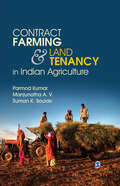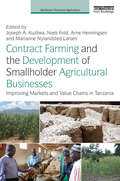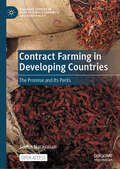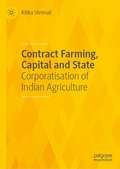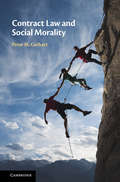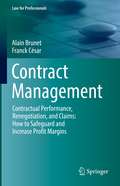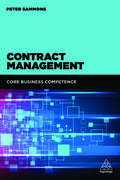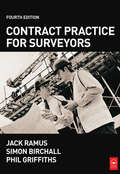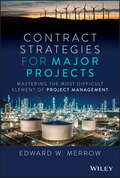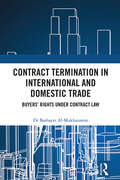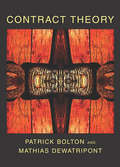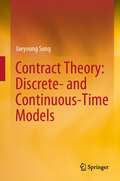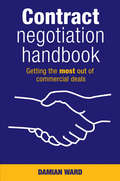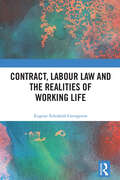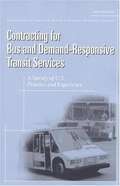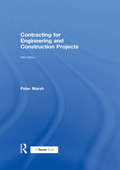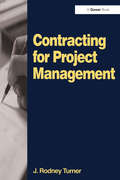- Table View
- List View
Contract Farming and Land Tenancy in Indian Agriculture
by Parmod Kumar A.V. Manjunatha Suman K. SouravContract Farming and Land Tenancy in Indian Agriculture explores key determinants that drive contractual/lease relationships through the examples of various existing arrangements in the country. It is based on the premise that contract farming or leasing can be an attractive option to policy makers keen on integrating the poor into the industrialized sector of the economy by helping them access the gains from trade that characterize successful agricultural tenancy arrangements. Agricultural diversification can be promoted through a favourable environment of policy support in the area of contract farming and by reforming land policies that will enhance the bargaining power of small holders. The book systematically analyses contract farming in the broader framework of existing land and lease market system. It contains cross-sectional assessment with field insights from various states. The book will help to formulate a strong policy in favour of stakeholders involved in contract farming and land tenancy in India.
Contract Farming and the Development of Smallholder Agricultural Businesses: Improving markets and value chains in Tanzania (Earthscan Food and Agriculture)
by Joseph A. Kuzilwa Fold Niels Henningsen Arne Marianne Nylandsted LarsenContract farming has received renewed attention recently as developing economies try to grapple with how to transform the agricultural sector and its associated value chains. This book examines different contract arrangements for selected crops, applying both qualitative and quantitative approaches in order to examine how contract farming affects smallholders and value chain dynamics in Tanzania. Major themes covered in the book include: contract farming policy; contract farming and value chain dynamics; contract farming adoption decisions; contract farming and income diversification. The authors also discuss alternative aspects of contract farming such as trust, conspiracy, empowerment and corporate social responsibility. The book presents original research from case studies conducted in Tanzania on sugarcane, tobacco, sunflower and cotton. These crops have a history of trials and errors with contract farming involving smallholders. Furthermore, they are targeted in national strategies as some of the main crops for establishment and upgrading of agro-industrial activities in Tanzania.
Contract Farming in Developing Countries: The Promise and Its Perils (Palgrave Studies in Agricultural Economics and Food Policy)
by Sudha NarayananContract farming is an institutional arrangement between farmers and businesses to produce and transact agricultural commodities at predetermined prices and conditions, and it has recently received a heightened amount of attention despite being a relatively old phenomenon. A new wave of agricultural industrialization and the emergence of large-scale food retailing in developing countries may be precipitating the unprecedented shift in favor of contract farming. This open access book identifies the methodological differences across disciplines that have generated a false binary in discussions of contract farming. The author explains the importance of adopting a more integrated theoretical perspective, providing insights into the ways in which this can reconcile conflicting positions. Given the immense diversity of contracting schemes, commodities and contexts—as well as the substantial regional differences in contract farming experiences across a range of outcomes—a syncretic understanding of contract farming is essential to the evaluation of the promise and perils of contract farming. The resulting book proposes a way forward that is holistic in nature, framing contract farming within a comparative institutional analysis so that it can better accommodate multidisciplinary priorities.
Contract Farming, Capital and State: Corporatisation of Indian Agriculture
by Ritika ShrimaliThe book argues that an increasing corporatisation of agriculture in India that is enabled by its neoliberal State, in the name of ‘development’, is contributing towards deepening of inequality in the rural India.It says that Contract Farming (CF) acts as a conduit that enables the coming together of myriad production relations (mercantile, finance, productive) to sell agri-commodities to the capitalist peasant. It is an accumulation strategy that brings together various factions of domestic and foreign capital together. It shows that CF as an accumulation strategy is enabled by an active interventionist state and this neoliberal Indian state mediates the relation between the agri-capital and Indian peasantry. The book further analyzes contract farming as a part of the totality of the capitalist mode of production in context of developing countries with a large agrarian base--- asking three fundamental questions – what is CF, how and why is it done and what are the implications of it.
Contract Law Minimalism
by Jonathan MorganCommercial contract law is in every sense optional given the choice between legal systems and law and arbitration. Its 'doctrines' are in fact virtually all default rules. Contract Law Minimalism advances the thesis that commercial parties prefer a minimalist law that sets out to enforce what they have decided - but does nothing else. The limited capacity of the legal process is the key to this 'minimalist' stance. This book considers evidence that such minimalism is indeed what commercial parties choose to govern their transactions. It critically engages with alternative schools of thought, that call for active regulation of contracts to promote either economic efficiency or the trust and co-operation necessary for 'relational contracting'. The book also necessarily argues against the view that private law should be understood non-instrumentally (whether through promissory morality, corrective justice, taxonomic rationality, or otherwise). It sketches a restatement of English contract law in line with the thesis.
Contract Law and Social Morality
by Peter M. GerhartWhen people in a relationship disagree about their obligations to each other, they need to rely on a method of reasoning that allows the relationship to flourish while advancing each person's private projects. This book presents a method of reasoning that reflects how people reason through disagreements and how courts create doctrine by reasoning about the obligations arising from the relationship. Built on the ideal of the other-regarding person, Contract Law and Social Morality displays a method of reasoning that allows one person to integrate their personal interests with the interests of another, determining how divergent interests can be balanced against each other. Called values-balancing reasoning, this methodology makes transparent the values at stake in a disagreement, and provides a neutral and objective way to identify and evaluate the trade-offs that are required if the relationship is to be sustained or terminated justly.
Contract Law in Changing Times: Asian Perspectives on Pacta Sunt Servanda (Markets and the Law)
by Normann WitzlebThis collection of essays provides a rich and contemporary discussion of the principle of pacta sunt servanda. This principle, which requires that valid agreements are to be honoured, is a cornerstone of contract law. Focusing on contributions from Asia, this book shows that, despite its natural and universal appeal, the pacta sunt servanda principle is neither absolute nor immutable. Exceptions to the binding force of contract must be available in limited circumstances to avoid hardship and unfairness. This book offers readers new comparative perspectives on the appropriate balance between contractual certainty and flexibility in an era of social instability. Expert authors, mostly from East and Southeast Asia, explore when their domestic legal systems allow exceptions from the binding force of contracts. Doctrines discussed include impossibility, frustration, change of circumstance, force majeure, illegality as well as rights of withdrawal. Other chapters consider the importance of the pacta principle in international law. The challenges posed by the COVID-19 pandemic feature strongly in the majority of contributions.
Contract Management: Contractual Performance, Renegotiation, and Claims: How to Safeguard and Increase Profit Margins (Law for Professionals)
by Alain Brunet Franck CésarThis book presents the latest findings relating to behavioral economics and the digital tools applied to contract management. There has been a decisive change in the role of contracts in the past decade, with contracts being transformed from purely legal necessities designed to protect against worst-case scenarios into tools for optimizing ongoing and mutually profitable business relationships with customers. There is an increasing emphasis on tight contracts, where time-risk and additional costs are passed on to the prime contractor, who may suffer heavy penalties in the event of non-performance. Contracts shape the behavior of the parties involved and as such have a major impact on project success. The contract manager’s goals are to protect the interests of the company and its shareholders by minimizing the company’s financial and contractual liabilities and to maximize its profitability while ensuring end-user satisfaction. The contract is usually written before the design is fully developed, and there is often a mismatch between contractual specifications and what the customer actually wants. Good contract management entails preserving the rights of the contractor by ensuring all parties respect their contractual obligations; providing advice to the project managers and engineering team; preparing profitable amendments to contracts or change requests; maintaining good record-keeping in the event that claims arise; filing notices when necessary; and guiding the project to a profitable conclusion. Like the ancient Chinese game of Go, moves made early in the game (notification of events) can shape the nature of a potential conflict one hundred moves later (arbitration threat). Contract management can also smooth the relationship between partners, allowing well-balanced “don’t-trade-a-dollar-for-a-penny” contracts to be managed through an established process rather than as sporadic events (we cannot claim to be in control of our business if we are not in control of the contracts on which it depends). Managing a contract with a mix of incomplete manuals, fragmented information, and poor planning can drive companies to “reinvent the wheel.” Contract management promotes a three-phase sequence to streamline information flows across the contract lifecycle, from the bid phase to performance, project closeout, and final payments.
Contract Management: Core Business Competence
by Peter SammonsContract management is a key management skill, yet it is underplayed in most organizations, which usually default to project management skills as a proxy for contract management skills. Whilst project management skills are equally essential, they are not the same thing. Contract Management looks at the wider contract management picture from an industrial-commercial perspective, and helps set-out typical structures and processes that assist the contract management task. The author uses diagramatic representations to depict complex ideas. Contract Management includes "learning points" in each chapter, looking at handling problems, procedural changes and enhancing commercial performance.
Contract Options for Buyers and Sellers of Talent in Professional Sports (Palgrave Pivots in Sports Economics)
by Duane W Rockerbie Stephen T. EastonThis Palgrave Pivot re-examines salary formation in Major League Baseball in light of real option theory to clarify the connection between salary and marginal revenue product for professional baseball players. Current literature has tended to treat single-year and multi-year contracts similarly, ignoring the potential option value for teams and for players. Recent work points to the observation that both high-productivity and low-productivity athletes have salaries that systematically differ from their marginal revenue product, and that free agents signing multi-year contracts are overpaid relative to free agents signing one-year contracts. This book argues that the value of signing an athlete to a contract should be determined similarly to the determination of the value of an investment project or a financial asset. This book demonstrates how to calculate the value of real options to the player and the team owner with a simple two-year contract, and offers extensions to the real options model for multiyear contracts or when a player is early or late in his career.
Contract Practice for Surveyors
by Simon Birchall J W RamusThis book provides a detailed guide to the principles and practice of construction contracts. It is written for both students and professionals working in all branches of surveying and construction. Based around the JCT 05 Standard Building Contracts, it has been fully revised and updated to reflect the latest versions of these contracts. The book sets out clearly what should be done at each stage of the construction contract process. Each step is illustrated with examples of good practice making clear the role and responsibilities of the surveyor and how responsibilities are best delivered. This fourth edition of Contract Practice for Surveyors builds on the book's reputation for clarity and simplicity to provide the most accessible and useful introductory guide to construction contracts available today.
Contract Strategies for Major Projects: Mastering the Most Difficult Element of Project Management
by Edward W. MerrowMajor Projects are Delayed by Months or Years, and Cost Millions More Than Budgeted, Because of Common Mistakes Made at the Contracting StageOrganizations that invest huge amounts of capital in major building/industrial projects almost never do the engineering and building themselves. They hire engineering and construction contractors to do it for them. Unfortunately, selecting contractors and negotiating the terms of a major project is one of the most difficult aspects of project management...and organizations waste billions of dollars and "bake in" months or years of delay by doing it wrong. Contracting is also the area of project management that is most prone to firmly held opinions unencumbered by any facts. We intend to remedy that situation with this book. Drawing on a properietary detailed database of over 1100 major projects, the world's leading industrial engineering project consultant, Ed Merrow explains: Key Principles of Contracting for Major Projects: Owners are from Mars; contractors are from Venus All the biggest risks in contracting belong to the owner Contracting &“games&” will normally be won by contractors, not owners Most risk transfer from owners to contractors is an illusion Contractors do good projects well and bad projects poorly Contractors may have shareholders, but they are not your shareholders! Mixing different contract types with different contractors on the same project is unwise Economize on the need for trust; trust only when being trustworthy has value Merrow also explains: Which contract incentives work and which don&’t and WHY Which of over a dozen contracting strategies work best and which ones hardly ever work and WHY The strategic advice in this book is designed for owners and contractor project managers, team members and supply chain, executives, and other business leaders involved in major projects. It's also an indispensable resource for engineers, leaders of industrial firms, bankers, and academics studying the messy realities of the construction and engineering industries.
Contract Termination in International and Domestic Trade: Buyers’ Rights Under Contract Law
by Bashayer Al-MukhaizeemThis book highlights the right to terminate a contract, yielding invaluable insights to enable policymakers and legal practitioners to facilitate international trade.In the modern landscape of globalised trade, the imperative of a harmonised legal framework of contract law capable of fostering stability and trust in cross-border trade has never been more pronounced. This is represented in the United Nations Convention on Contracts for the International Sale of Goods (CISG), providing rules that can be known, understood and abided by globally. This book focuses on the termination of contracts, one of the harshest remedies when a sale of goods contract is breached by the seller. Breaches by the seller dealt in this book are confined to breaches of contractual description, delivery time and quality of goods, which are the most common violations of sale of goods contracts. This book scrutinises the methods adopted for challenging or facilitating contractual termination by CISG as a transnational law, as well as the Sale of Goods Act 1979 (SGA) and Kuwaiti law (KLaw), both of which are national laws of non-contracting states of CISG. This study also draws attention to lacunae and practical issues, focusing on critical analyses of law and cases, and recognises the adopted themes underlying each law to find the degree of their legal clarity and the threshold upon which termination can be granted. This comprehensive analysis also provides inspiration for beneficial changes by weighing the pros and cons of each system.The book will be of interest to practitioners, students, and scholars in the fields of contract law, trade law, commercial law and international law.
Contract Theory
by Mathias Dewatripont Patrick BoltonA comprehensive introduction to contract theory, emphasizing common themes and methodologies as well as applications in key areas. Despite the vast research literature on topics relating to contract theory, only a few of the field's core ideas are covered in microeconomics textbooks. This long-awaited book fills the need for a comprehensive textbook on contract theory suitable for use at the graduate and advanced undergraduate levels. It covers the areas of agency theory, information economics, and organization theory, highlighting common themes and methodologies and presenting the main ideas in an accessible way. It also presents many applications in all areas of economics, especially labor economics, industrial organization, and corporate finance. The book emphasizes applications rather than general theorems while providing self-contained, intuitive treatment of the simple models analyzed. In this way, it can also serve as a reference for researchers interested in building contract-theoretic models in applied contexts.The book covers all the major topics in contract theory taught in most graduate courses. It begins by discussing such basic ideas in incentive and information theory as screening, signaling, and moral hazard. Subsequent sections treat multilateral contracting with private information or hidden actions, covering auction theory, bilateral trade under private information, and the theory of the internal organization of firms; long-term contracts with private information or hidden actions; and incomplete contracts, the theory of ownership and control, and contracting with externalities. Each chapter ends with a guide to the relevant literature. Exercises appear in a separate chapter at the end of the book.
Contract Theory: Discrete- and Continuous-Time Models
by Jaeyoung SungThis book provides a self-contained introduction to discrete-time and continuous-time models in contracting theory to advanced undergraduate and graduate students in economics and finance and researchers focusing on closed-form solutions and their economic implications. Discrete-time models are introduced to highlight important elements in both economics and mathematics of contracting problems and to serve as a bridge for continuous-time models and their applications. The book serves as a bridge between the currently two almost separate strands of textbooks on discrete- and continuous-time contracting models This book is written in a manner that makes complex mathematical concepts more accessible to economists. However, it would also be an invaluable tool for applied mathematicians who are looking to learn about possible economic applications of various control methods.
Contract for the International Carriage of Goods by Road (Law for Professionals)
by Chiara TincaniThis book discusses the intensification of international transport services as the consequence of an increasingly capillary economic integration. In particular, in some European countries, such as Belgium, the Rhine area of Germany, and Denmark, the application of the Geneva Convention on the carriage of goods from the case law point of view is even more thorough than that of national law. Even though this is not the case for all countries, the Geneva Convention is a core text both for the scientific debates on the issue and for commercial operators. Therefore, proposing an up-to-date reading of the Convention is of utmost importance from the practical point of view, especially considering that, thanks to the consistent application of the International Carriage of Goods by Road contract, the Convention has become an essential prerequisite for the development of traffic.In ten chapters, this book reviews the Convention’s structure and considers the case-law approaches and trends of most countries belonging to the European Union. It covers contracts and different negotiating models as well as compensation, liability of the carrier, and damages.
Contract negotiation handbook
by Damian WardA good commercial contract is both a springboard and a safety net -- it provides the opportunity to expand and grow your business, but also to protect it if things go wrong. In a tough commercial world, getting the best deal you can is paramount. The Contract Negotiation Handbook demystifies complex legal principles so that busy businesspeople can quickly and easily digest them. With clear, practical examples and case studies to help illustrate and explain different types of contracts and contractual situations, this comprehensive handbook will help you: prepare for negotiations and identify contractual terms make sure you have covered the 'springboard and the safety net' -- combining the appealing and less appealing aspects of contracts identify the type of negotiator that your counter party is and how that affects your negotiations develop an overview of contract law devise a negotiation strategy identify whether you are in a contractual dispute prepare for and acquire the best result out of any contractual dispute.
Contract, Labour Law and the Realities of Working Life
by Eugene Schofield-GeorgesonThis book offers a critical and timely account of how labour law has become a means for protecting employers rather than workers.The past few decades have witnessed something of a ‘silent revolution’ in the traditional protective role that labour law has played in the lives of workers. While this transformation has been overt in the realm of the market and at the level of the legislature, the role of the judiciary in this process remains significantly under-studied. Focussing on Australia, but drawing also on material from New Zealand, the UK and Canada, this book investigates how the common law has intervened to shape labour law in the image of commercial contract, determining disputes and defining legal issues by ignoring the realities of working life. Under this new conception of labour law, industrial relations between workers and employers are rarely reciprocal or relational. Rather, they are determined by the legal meaning and purpose of the contract of employment, drafted by lawyers for the benefit of employers and their human resources departments. Having demonstrated how approaches to contractual formalist legal reasoning have redefined labour law, this book goes on to propose an array of innovative legal and policy strategies to restore the protective role of labour law to the employment relationship.Scholarly, but also accessible to students, this book will appeal to those with interests in labour law, contract law and sociolegal studies.
Contracting International Employee Participation: Global Framework Agreements (International Law and Economics)
by Felix HadwigerIn the last two decades, multinational companies (MNCs) and global union federations (GUFs) have started to negotiate so-called global framework agreements (GFAs) which define minimum standards for labor conditions across their locations. This book focuses on the question why companies conclude GFAs, and identifies four groups of incentives: reduction and privatization of conflicts; public relations; promotion of equal competitive conditions; exogenous requirements and avoidance of public regulation. Based on an in-depth analysis of incentives considered to play a dominant role in the decision of companies to conclude GFAs, the book attempts to predict under which conditions GFAs can be expected to proliferate in the future.
Contracting With Organized Delivery Systems: Selecting, Evaluating, and Negotiating Contracts (APA Practitioner's Toolbox Series)
by American Psychological AssociationThis manual was written to serve both as a reference and as a tool to help providers practice more efficiently in a changing, demanding marketplace. Discusses terminology, contract evaluation, Payer and Provider Responsibilities. Good tool for therapist considering working with managed care systems.
Contracting and Control in Venture Capital
by Paul A. GompersDiscusses the control mechanisms and contracts utilized by venture capitalists. The emphasis is on understanding potential conflicts of interest and how the contracts mitigate those conflicts.
Contracting and Safety: Exploring Outsourcing Practices in High-Hazard Industries (SpringerBriefs in Applied Sciences and Technology)
by Jan Hayes Stéphanie TillementThis open access book examines the increase in outsourcing, contracting and subcontracting as ways of organising work. It explores the impact of these employment arrangements on public safety, particularly when they are linked to complex supply networks in a range of engineering industries including oil and gas, nuclear power and aviation. The brief provides practical recommendations on how best to manage arrangements that target short-term profitability and also maintain excellence in long-term safety outcomes. The brief is a source of advice for organisations on how to maximise the benefits and minimise long-term system reliability issues that can be introduced by contracting and outsourcing, rather than assuming it to be a wholly negative or positive practice. Contracting and Safety comprises qualitative, empirical studies focusing on high-reliability organisation. As such, this brief provides a rich picture of the experience of working in complex supply chains. It will be of interest to researchers in industrial safety, as well as safety professionals and project managers within engineering industries.
Contracting for Bus and Demand-Responsive Transit Services: A Survey of U.S. Practice and Experience
by National Research CouncilThe National Academies Press (NAP)--publisher for the National Academies--publishes more than 200 books a year offering the most authoritative views, definitive information, and groundbreaking recommendations on a wide range of topics in science, engineering, and health. Our books are unique in that they are authored by the nation's leading experts in every scientific field.
Contracting for Engineering and Construction Projects
by Peter MarshPeter Marsh’s book has long been recognized as a standard work. With its emphasis on the commercial aspects of contracting, this book represents an eminently practical guide to this complex subject for purchaser and contractor alike. This edition reflects recent changes in case law and legislation, the major change being the passing of the Housing Grants, Construction and Regeneration Act 1996. The book also charts changes to model forms of contract conditions, in particular the new PACE forms of government contracts. Contracts covered are those for the construction of buildings and civil engineering works, the supply and installation of mechanical, electrical and process plants and also for computer system and facilities management. Methods of contracting, including PFI schemes, are critically examined and reference is made to the Government’s latest thinking on prime contracting. As in previous editions, this book covers contract planning and contract administration, deals with both the preparation and the appraisal of tenders and explains in detail how to draft the key clauses in a contract to ensure the maximum advantage. In this revised version, Contracting for Engineering and Construction Projects will continue to serve the needs of purchasing and contracts staff, engineers, quantity surveyors, project managers and legal advisers seeking a reliable source of guidance.
Contracting for Project Management
by J. Rodney TurnerIn all but the smallest of projects the project sponsor inevitably has to buy in the goods and services of other suppliers. This requires people to make contracts so that they know the basis on which they are working with each other and to deal with any disagreements that subsequently arise. So a knowledge of contracting specifically for project management is essential if a project is to avoid difficulties and reach a successful conclusion. This book concentrates specifically on the contracting issues that surround projects of any size.
